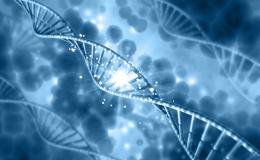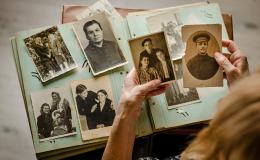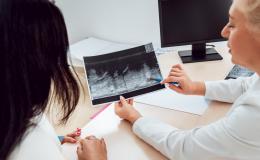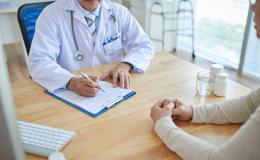What Are the Signs and Symptoms of Breast Cancer?
October 13, 2020
About one in every eight women in the United States will be diagnosed with an invasive breast cancer in her lifetime, making breast cancer the second most common cancer diagnosed in women.1
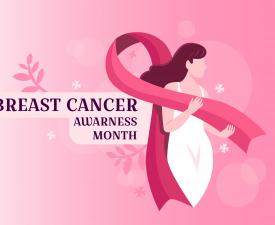
And while the incidence of breast cancer in the U.S. has remained constant over time, earlier diagnosis and better treatments have pushed the average 5-year survival rate for the disease to 90%.2 In recognition of Breast Cancer Awareness Month this October, we outline some of the signs and symptoms of breast cancer and what you should do if you or someone you care about is experiencing symptoms consistent with the disease.
As the name suggests, breast cancers are cancers that originate in breast cells. Different types of breast cancer are classified by the characteristics of the cancer cells, the type of cell the cancer started from and whether or not the cancer has migrated from the location where it originally developed. Symptoms of the disease can vary widely depending on the type and stage of breast cancer an individual develops, and early stages of the disease may present few, if any symptoms. Some of the signs and symptoms of breast cancer include:
- Lump(s) felt on or inside the breast
- Thickening of breast tissue
- Changes in breast size, shape, appearance or color
- Changes in the appearance of one or both nipples
- Dimpling, peeling, redness or other changes in breast skin or one or both areolas
- Nipple discharge (excluding breast milk)
- Irritated, itchy or painful breasts
- Breasts that feel hard or warm to the touch
If you or someone you care about is experiencing any of these symptoms, even if a mammogram was recently performed, it is important to schedule an appointment with a physician.
Breast and other cancers are more likely to develop in individuals, including men, that inherit an altered, or mutated, copy of a gene that functions in regulating cell growth and division. Individuals that inherit a mutation in a gene associated with breast cancer can pass this mutation to their children, making the breast cancer hereditary. While not every person with a hereditary breast cancer gene mutation will eventually develop cancer, some mutations can significantly increase the likelihood of disease development. In fact, women with mutations in either the BRCA1 or BRCA2 genes have a 70% chance of developing breast cancer by the time they reach 80 years of age.3
Regardless of whether or not a breast cancer is caused by an inherited gene mutation, the research is clear: disease prognosis is better when a cancer is detected early. And importantly, earlier cancer detection can not only save lives, but also increase a patient’s quality of life. Regular screening mammograms play a critical role in earlier breast cancer diagnosis and treatment. Additionally, if you have a family history of cancer, particularly on one side of the family, be sure to discuss this with your doctor to determine your hereditary cancer risk. Comprehensive hereditary cancer screening can provide clinicians with the specific gene mutation a patient carries, allowing them to more efficiently monitor for cancers associated with the mutation. Kailos Genetics’ ExpedioTM Hereditary Cancer Screening test is designed to screen patient DNA for adverse mutations in a variety of genes associated with hereditary cancer, including breast cancer. Click here to learn more about ExpedioTM or contact us with any questions you have regarding our genetic screenings.
